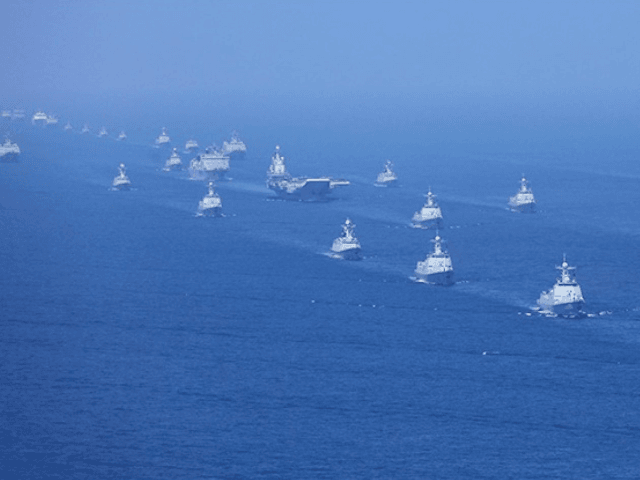Chinese Communist Party leader traveled to the South China Sea on Thursday to preside over what state media are calling “the country’s largest ever maritime military parade,” a series of exercises meant to intimidate rival powers in a region where Beijing has illegally colonized foreign territory.
The Chinese state newspaper Global Times reports that Xi was on hand to inspire the People’s Liberation Army (PLA) with an address on why naval power is more important than ever, as well as to inspect the country’s new naval assets. The parade featured a display of China’s Liaoning, the nation’s only aircraft carrier, which made its debut at a military display.
Along with the Liaoning, China paraded “forty-eight warships, 76 aircraft and more than 10,000 sailors and soldiers,” the Times noted.
Experts commenting to the Global Times emphasized that the display was not for show and that China was preparing for war.
“China’s upgraded navy signifies the PLA is not afraid of war and is capable of winning any battle,” military expert Song Zhongping said. “The Thursday parade could also serve as a deterrence to maritime hegemony, making adversaries think twice before attempting to harm China’s core national interests.”
Another naval expert identified as Li Jie told the newspaper that “holding the parade in the South China Sea was a strategic move as the waters are a potential combat zone,” noting that the United States has routinely conducted Freedom of Navigation Operations (FONOPs) in the region. This week, the nuclear-powered USS Theodore Roosevelt traveled through the area.
The event also served as an opportunity for the nation’s soldiers to venerate Xi in person.
“It is my utmost honor to be inspected by Chairman Xi,” Ma Xiaohui, a navy soldier, told the state outlet Xinhua. “I will maintain momentum, train hard, and always be Chairman Xi’s good soldier.” The soldiers reportedly all greeted Xi with the salute, “Hail to you, chairman.”
Xi addressed the soldiers with a speech urging them to “fully implement the Party’s absolute leadership over the armed forces, be firm in ideals and convictions, and uphold the glorious traditions, while pushing for technological innovation, developing new types of battle forces, and building a modern maritime combat system,” according to Xinhua. Xi declared that China’s army has “stood up in the East” as the dominant force in the region.
Following his appearance at the military display, Xi went on to the southern island of Hainan, in the South China Sea near Vietnam and its Paracel Islands, which China illegally claims as its own. At an event on the island – previously an agricultural backwater that the Communist Party is attempting to turn into a tropical tourist destination – Xi declared he would turn Hainan into “a vivid example of socialism with Chinese characteristics for a new era,” the official name of the philosophy more commonly known as “Xi Jinping Thought.”
“The central government will support Hainan in establishing trading venues for global energy, shipping, commodities, property, equity, and carbon emission rights,” he promised, while also declaring Hainan a “pilot free trade zone” exempt from many of the Communist Party’s onerous controls.
As an undisputed Chinese South China Sea island, Hainan is on the front lines of both the One Belt, One Road (OBOR) initiative to dominate global trade and of China’s plan to take over the entirety of the South China Sea, including territories that international legal tribunals have declared are not Chinese.
China claims territory belonging to Vietnam, the Philippines, Brunei, Taiwan, Malaysia, and waters near Indonesia’s exclusive economic zone. In 2016, the Permanent Court of Arbitration at the Hague ruled against China’s claims in the region and declared its military development in the region illegal. China vowed to disregard the ruling and continue building on foreign territory. By the end of 2017, Xi Jinping declared China the “keeper of international order,” implying that international legal norms China disagreed with were illegitimate.
China has built several artificial islands on atolls in the Spratly and Paracel Islands and equipped them with military weaponry and surveillance technology. This week, reports surfaced that China had installed military jamming equipment on its islands, potentially disrupting communication between non-Chinese vessels in the region and their countries.

COMMENTS
Please let us know if you're having issues with commenting.